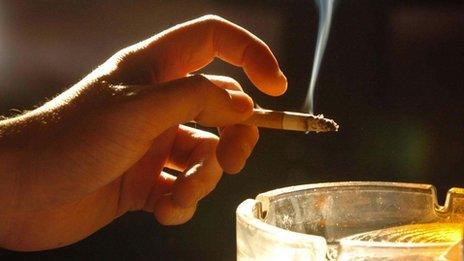Ten years of workplace smoking ban in Republic of Ireland
- Published

The Republic of Ireland was the first to introduce a complete workplace smoking ban in 2004
Ten years ago the Republic of Ireland became the first country in the world to introduce a workplace smoking ban.
People in the Republic got used very quickly to the smoking ban, which has been followed by many other states.
Many wondered at the time whether pubs could ever be smoke-free - the pint and the fag just seemed such an intrinsic part of Irish culture.
But within weeks it was not uncommon to see smokers gathered in small clusters outside bars puffing away, even when the pubs weren't supposed to be open.
It seemed it was acceptable to break the licensing laws, but not the smoking ban.
I still remember the shock to the system at the time of going to pubs in Northern Ireland, shortly after the Republic's ban was introduced, and feeling as though my throat was being assaulted by other people's smoke.
Although the measure soon became the way of life and was replicated in other jurisdictions, 10 years on there's a debate about how successful it has been and about what should happen next.
'Great success'
Fianna Fáil leader, Micheal Martin, who as health minister introduced the ban, has said he wants to see a smoke-free society.
The current health minister, Dr James Reilly, agrees.
He said the ban, which is estimated to have saved 3,700 lives, has been a great success, but more needs to be done.
He is very keen that cigarette packaging graphically illustrates the ill-effects of smoking, especially to young people.
"It's very clear, given that nearly 78% of smokers in survey after survey will tell you they started smoking under the age of 18, that this industry focuses and targets our children," he said.
Anti-smoking campaigning pressure groups have also been to the fore in praising the success of the ban.
The Irish Cancer Society claims there has been a 25% reduction in the number of people smoking since the measure was introduced.
The Irish Heart Foundation says that heart attacks have reduced by over 10% as a result of the ban.
The Royal College of Physicians of Ireland is calling for a complete smoking ban in cars whenever children are present.
Dr Reilly, a strong critic of the tobacco industry partly because of his experience as a GP before entering politics, is sympathetic to that argument.
But the smokers pressure group, Forest Eireann, strongly rejects calls for a car ban when children are in it.
Its spokesman, John Mallon, said that while the group does not condone such behaviour, "by and large" people do not smoke when there are children in vehicles.
"It's heavy handed and extremely patronising", he says of the proposed measure.
The college of physicians also wants all publicly-funded institutions, especially hospitals and academic campuses, to be completely smoke-free.
In the 10 years since the measure was brought in, the price of cigarettes has continued to rise dramatically because of government taxes.
Indeed, some cynics have wondered whether the Irish state will be able to wean itself off its addiction to tobacco taxes.
Vaping
But the Republic still has higher numbers of people smoking than the government would like.
So, now there is another debate about the merits and use of e-cigarettes and "vaping".
The government has no policy on the issue at the moment, but recognises that many people have in recent times being able to quit cigarettes by inhaling the e-cigarettes and exhaling its vapours, a practise many believe is much less harmful than inhaling the tobacco of cigarettes.
While the government has yet to come to a position on this alternative to smoking, several of the Republic's public transport bodies have: Irish Rail and Dublin Bus have both banned "vaping".
Indeed, such is the speed at which people got used to the workplace smoking ban, that it would hardly come as a surprise if the sight of people using e-cigarettes soon became more common than the sight of people smoking old-fashioned cigarettes.
Smoking tobacco: So last century?
- Published3 October 2013
- Published24 April 2012